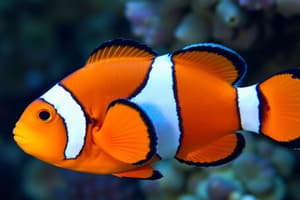Podcast
Questions and Answers
What is the name of the Family for the common house mouse species, mus musculus?
What is the name of the Family for the common house mouse species, mus musculus?
- Mammalia
- Muridae (correct)
- Rodentia
- Mus
Organisms from the same phylum all belong to the same _____
Organisms from the same phylum all belong to the same _____
Kingdom
How can natural selection be defined?
How can natural selection be defined?
A process in which organisms with certain inherited traits are more likely to survive and reproduce than individuals with other traits.
What does homology provide evidence of?
What does homology provide evidence of?
What does the similarity of embryos of fish, frogs, birds, and humans indicate?
What does the similarity of embryos of fish, frogs, birds, and humans indicate?
What do we call scientists who study fossils?
What do we call scientists who study fossils?
What is the study of the geographic distribution of species on Earth called?
What is the study of the geographic distribution of species on Earth called?
Which of the following represents a population?
Which of the following represents a population?
What can create new alleles?
What can create new alleles?
What makes up the total collection of alleles in a population at any one time?
What makes up the total collection of alleles in a population at any one time?
Flashcards are hidden until you start studying
Study Notes
Taxonomic Classification
- Common house mouse: Mus musculus
- Family name: Muridae
- Taxonomic hierarchy: Mus (Genus), Muridae (Family), Rodentia (Order), Mammalia (Class), Chordata (Phylum), Animalia (Kingdom), Eukarya (Domain)
Biological Classification
- Organisms from the same phylum belong to one Kingdom
Natural Selection
- Defined as a process where organisms with inherited advantageous traits are more likely to survive and reproduce
Homology
- Homology provides evidence for common ancestry among species
Embryonic Similarity
- Similarities in embryos of fish, frogs, birds, and humans indicate common ancestry
Fossil Studies
- Scientists specializing in the study of fossils are known as paleontologists
Biogeography
- Biogeography is the study of species' geographic distribution across Earth
Population Definition
- A population consists of a group of individuals of the same species living in a specific area, exemplified by termites infesting a house
Allele Creation
- New alleles within a population can be produced through mutations
Gene Pool Concept
- The gene pool represents the total collection of alleles available within a population at any given time
Studying That Suits You
Use AI to generate personalized quizzes and flashcards to suit your learning preferences.




